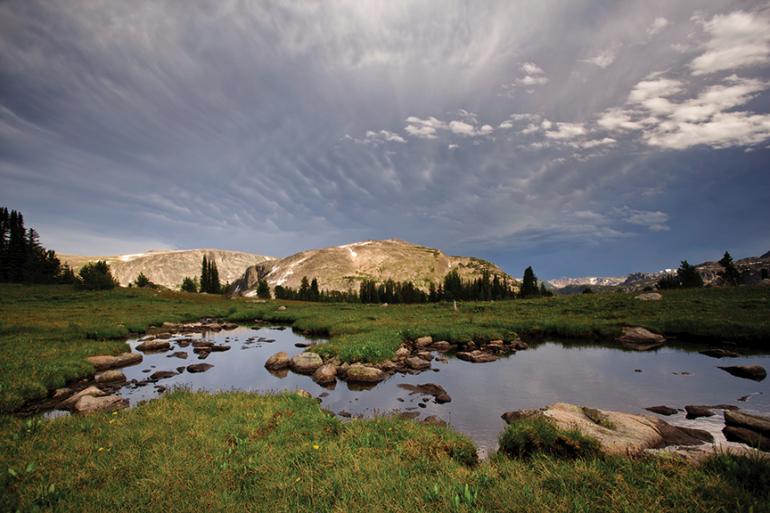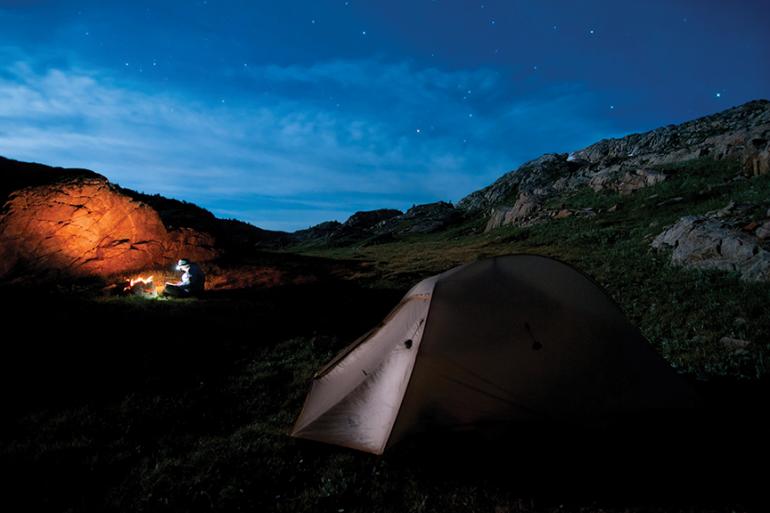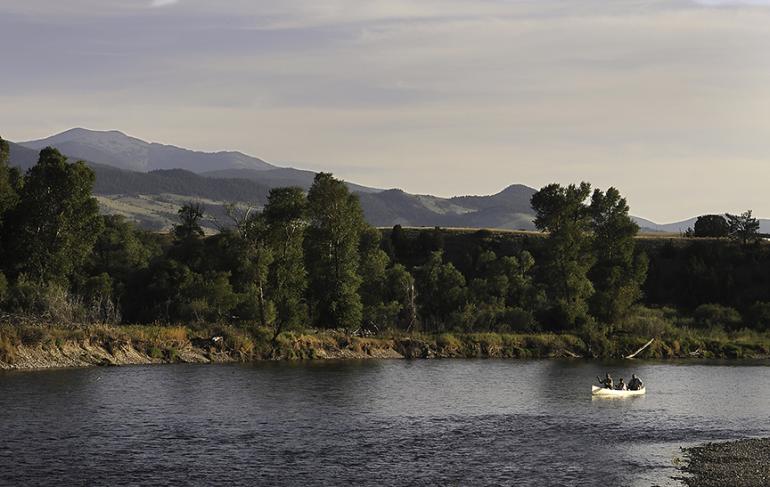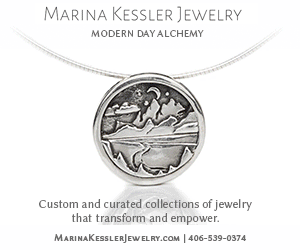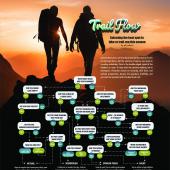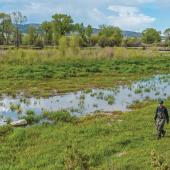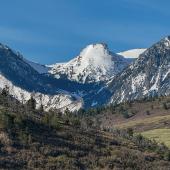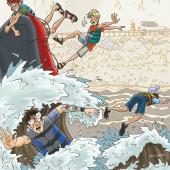Igniting the Passion
How wilderness flows through time.
There is much I don’t know about the things that have shaped me, but I do know the moment when my passion for wild places was lit. I was 11 years old. My schoolteacher parents had summers off, and once or twice a year we’d take a family adventure, a caravan of Rambler station wagons and Volkswagen vans. That particular summer, we drove west to my dad’s childhood home of Montana.
We stopped in Stillwater country at a ranch that had been in my father’s family for generations, continuing up the dirt road into the foothills and the high, airy sweep of the Beartooth Plateau. We drove for the better part of a day, along steep ravines, beneath aprons of snow, bumping through lodgepole forests. The road got less passable by the mile, and when we finally stopped, the track petered out in front of us into an alpine meadow just below treeline.
We made the basecamp where we stayed for a week without seeing anyone. We spent our time messing around in the high country, taking what came to us. Each day we set off to explore in a new direction, our lunch in a canvas rucksack. On one warm afternoon we discovered a series of deep pools and falls in the creek, smooth ramps of rock we sliddown like otters, shockingly cold plunges into clear pools, waterfalls we could duck behind. Another morning, I glanced into a small clearing along a forested trail, a lush mossy spot full of sunlight. Thirty feet away, a spotted fawn looked back at me. The tiny deer was motionless, lying in the open glade, its eyes huge and liquid. I could hear it breathe.
At our base camp we constructed a rock icebox in the creek to keep the perishables cold, with walls stout enough to withstand a flashflood. Deer grazed through the meadows at twilight. Every night we heated iron-rich rocks in the fire, wrapped them in towels, and put them in the bottoms of our flannel sleeping bags like hot-water bottles.
On our longest dayhike we came across the large, fresh tracks of a moose. We followed the trail—huge, cloven prints the size of my hand. Even at 11 and susceptible to miracle, I thought the chances of catching up to that moose were pretty slim. But damned if we didn’t, hours later, stumble to the edge of a marshy lake where the bull moose fed on succulent pond growth. He looked as big as a hillside, standing knee-deep in the muck, antlers like canoe paddles. I got ahead of my family on my way back to camp—I’d been reading about Mowgli the Jungle Boy, and my imagination was charging along like a Montana coal train. I would become a Mountain Boy! All I had to do was duck off the trail and disappear into the forests and meadows. I would learn to snare my food, make my shelter in caves, strike fire with sparks. The animals would incorporate me into their fabulous world.
The only thing that kept me from plunging fully into the woods was the irresistible lure of the camp stew I knew was waiting ahead. Decades have since passed, but that time in the Beartooths is embedded in my memory with crystalline vividness, a nugget of experience kept somewhere immune to the erosion of time. It is a kind of talisman, a touchstone, that I can reach back and grab hold of.
My childhood was steeped in the rituals of camping the way other children’s lives were redolent with religion. My friends had catechism or Sunday School or the solemn weight of High Mass. I had the mildewed scent of our canvas umbrella tent and the unvarying system of packing the bus with rolled sleeping bags, the folding table, camp stove, and tent.
A zeal for things wild and an appetite for adventure are the intangibles in the maze of my inheritance. Nothing you’d come across in an estate settlement and not the traceable stuff of genes. There is, to my knowledge, no gene for adventure. But these traits are no less fundamental to my makeup than eye color or blood type. Come to think of it, they are a good deal more fundamental. They are the gifts passed on by dint of my parents’ enthusiasm and will and resourcefulness. My mother telling stories in the ruddy light of a campfire on the shore of Lake Superior… a ridge trail through foggy stunted forest in the White Mountains of New Hampshire… a night sky aflame with meteors along the Stillwater River in Montana.
In the dim awareness of my youth, I began to grasp the circular nature of this business, the extent to which it is like passing a torch. On a climb to the summit of Mosquito Peak as a teenager, it came to me with the power of an epiphany that my brother and I were stronger hikers than my father, a man who a few years earlier had carried us on his shoulders when we got tired. And again, during a college vacation spent snowshoeing in Yellowstone Park, I realized with no small surge of satisfaction that there were winter camping skills I could impart to my dad.
I can’t prove what I'm about to say, but I believe it to be true. The wilderness gave my wife Marypat and I our children. More precisely, wild waters gave us our children. That Marypat became pregnant at all is something of a miracle. Our first son took hold and flourished where nothing could before. By the time he planted himself, I had given up after years of failure.
It was mid-winter when Marypat announced that she was pregnant. Mid-winter at 60 degrees north latitude in Saskatchewan, hundreds of miles from the nearest road that connects to anything, where snow lay quilt-like on the boreal land, where the ice of Lake Athabasca had grown four feet thick.
We lived in a cabin on a deep bay, where we could go months without seeing anyone. The lynx, silver fox, wolves, and ptarmigan were more regular neighbors than the people who lived in small communities across the frozen lake. At night the silence was as deep as the black sky—the Northern Lights flowing like rivers through the stars.
That February, we were halfway through a self-imposed cycle of wilderness therapy in a journey across Canada. By the time Marypat made her announcement, we had paddled our canoe more than 1,000 miles and lived together in the wilderness for seven months.
I have no idea what transpired physiologically. I do know that the knots of tension that had pulled tight over the years were loosened, that we relaxed together, that we laughed more, that we hunkered down somewhere centered and clear and uncomplicated, the way we eventually always do on long trips. Through this, the possibility of birth took hold.
In June, five months along in the pregnancy, we had to decide whether to push on with our journey, to continue northeast nearly 1,000 miles across the remote tundra of Canada. In that trackless expanse we would be utterly on our own.
We borrowed a motorboat from a fishing camp and roared across 15 miles of recently thawed lake to a tiny community clinic in the nearest Chipewyan town. The doctor who flew in once a week to see patients didn’t know us from Santa Claus. He listened to the fast, gushing heartbeat thumping along inside Marypat. He palpated the size of the fetus. He took a urine sample and checked vital signs. He listened to our concerns about the rigors of portaging and camping, our description of the sweep of wilderness we would cross.
“I can’t decide what you should do,” he said, at the end of the appointment. “There is risk involved with anything. I can tell you that you’re very healthy, and that all the signs are strong. A woman should be able to perform normal activities well into her seventh month. Most women wouldn’t consider this sort of trip normal, but for you, I have the sense that it might be.”
That physician has no idea what a debt of gratitude we owe him. Had he been the least bit alarmist, had he taken us to task for our unconventional approach to prenatal care, had he enumerated even a few of the things that might have gone awry in the months of wilderness living, I have no question that we would have scurried for home.
As it was, the decision was still an excruciating one. Our families quietly lobbied for us to return. Friends openly wondered about the risk we were taking. We had no shortage of wakeful nights ourselves, imagining dire scenes on the lonely tundra.
Yet within a mile of paddling away from shore, I knew we had done the best thing. Giving that baby a kind of fetal baptism on a wilderness river felt absolutely right. What we had been thinking of in terms of risking the pregnancy, was, I realized in those first strokes, actually a way of honoring it.
That summer established a precedent, and became the first in a series of water journeys in honor of our children.
Each of our three kids has what I think of as their birth river. For Eli it is the Kazan, the pristine tundra watercourse coursing through the Northwest Territories. Sawyer’s is the Yellowstone, the last of the undammed rivers in the Lower 48, flowing through more than 600 miles of Montana and Wyoming. Eli was eight months young, and ensconced in the bow of our red canoe during the four-week descent of the entire navigable length of that great river. Sawyer was a fetal bud, his heart beating as fast as a bird’s, picking up the language of current and country in whatever mysterious ways human buds do.
Ruby had to wait until she was seven months along before she got hers, but then she rode down through the lower canyons of the Rio Grande along the Big Bend border country between Texas and Mexico.
Several years ago at Christmas, dad fell down a flight of stairs. Mom found him, unconscious and bleeding, on the cement floor—a terrifying moment.
He had broken his nose, dislocated his shoulder, and sustained a number of painful bruises. The fall put a serious crimp in their travel plans that year, and led to a process of physical rehabilitation that continues to this day.
Both of my parents are old. Dad’s lifetime dedication to intense physical fitness has slowed to a more pedestrian routine of brisk walks and methodical lap swims. Because of his shoulder injury, he has difficulty swinging an axe to split firewood, among other mundane household chores.
When Marypat and I invited the two of them to join our family for a five-day canoe trip on the Yellowstone River, dad said that paddling was something he thought he could manage. He actually went out in the yard, sat in the old aluminum boat, and took some practice strokes to make sure.
We met them at a boat ramp just below the diversion dam in Forsyth, Montana. Our route would take us 80 miles downstream, to the confluence with the Powder River. The Yellowstone, even late in the summer, is a lively, heads-up river, full of deceptive eddy currents, upwellings, and cottonwood snags lurking in the channel. The current is strong enough that it’s difficult to stand more than knee-deep in the flow.
Dad’s paddle stroke was awkward—he could only stroke on one side of the boat, and I could tell that keeping it up was as much a matter of gumption as physical ability. Luckily the current did most of the work.
My folks are competent campers, perfectly capable of conducting themselves well in the wilds, but on this outing Marypat and I were the guides, and my parents followed our lead down the river, trusted our choices, let us dictate the pace.
For the kids, having grandparents along was like a weeklong gift. They mined my mother for her inexhaustible fund of stories. They led agate-hunting forays and treasure hunts, wheedling snack food out of my parents along the way.
Eli, Sawyer, and Ruby are good in the outdoors. They are as comfortable sleeping on sandbars as they are on bunk beds. They think nothing of perching on boulders to eat their dinner. On the quiet stretches of river, we tie the boys to the stern lines and troll them behind us like big, giggly bobbers.
At our last night’s camp, there was a slight drop in the river where it goes over a ledge, followed by a choppy set of standing waves. The boys like to hold on to us and swim through minor rapids with their life jackets on. Marypat and I took turns edging out into the strong river, sidestepping across the slippery, uneven bottom until we were waist-deep and could barely stand. The boys had long lost their footing. They hung on at arm’s length, their naked bodies surfing across the current. Finally we lifted our feet, let the river have us, and lay back for the ride.
On the final lap, Eli was as determined to get into the waves as I was to stay in the deep water. We stroked against each other with our free hands, laughing and yelling. Then I felt him shake his small hand out of mine. He started to swim away and we lost each other in the fast water. I saw him bob over a wave crest once, and I struggled to stand up as soon as I could. By the time I get to my feet Eli was already up, sloshing toward shore, giddy with his triumph.
At the confluence with the Powder River, we slogged upstream in the shallow, gritty current almost half a mile to get to our car. The river wasn’t deep enough to paddle against effectively, so we exited the canoes and started hauling, using the bowlines as tow ropes.
I worried about my folks, who were making slow progress. When I glanced back, Eli had clambered over the side to help. He was waist-deep in the Powder, pushing the stern for all he was worth, grinning back at me like a fiend. While tempted to tell him to get the hell in the boat, it was clear he was having no trouble at all with the river.
By the time I reached my parents, they were within 50 yards of the bridge. Dad was barely winded. They were simply pacing themselves, much the way Marypat paced herself when she was seven months pregnant in the Far North.
In the shade of the railroad trestle, our gear was strewn around us. Everyone was dripping wet, exclaiming in various ways about what a unique end to the trip it was. And I was having real trouble trying to decide who to be more proud of, my parents or my children.
Alan Kesselheim's latest books are Let them Paddle: Coming of Age on the Water (Fulcrum) and Montana: Real Place, Real People (Companion Press). This story is adapted from one that first appeared in a 1998 edition of Backpacker magazine.


